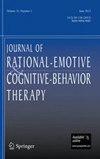Overview study of Compassion-Focused Therapy(CFT)
IF 1.4
4区 心理学
Q3 PSYCHOLOGY, CLINICAL
Journal of Rational-Emotive and Cognitive-Behavior Therapy
Pub Date : 2023-02-28
DOI:10.54382/krecbt.2023.3.1.51
引用次数: 0
Abstract
The purpose of this study is to overview of Compassion Focused Therapy and the characteristics of the program, to suggest the application plan and research direction of domestic cognitive behavioral therapy, and to provide a theoretical basis that can be applied to clients with various psychological problems. and to provide practical assistance in counseling. To this end, this study reviewed previous studies based on the theory of compassion-centered therapy, and reviewed the core concepts of the theory and the characteristics of the program. The conclusion is as follows. First, Compassion Focused Therapy can be applied to people who have high levels of shame and self-blame, who tend to have chronic psychological problems, and who have difficulty or fear of self-gentleness and self-acceptance. Second, Compassion Focused Therapy targets self-criticism and shame, and seeks to enhance a sense of belonging, especially the ability to experience self-generating and self-centered belonging. Third, the Compassion-centered treatment program utilizes the emotional control system to expand and maintain the compassionate mind within oneself. Fourth, compassion-centered therapy can help to increase personal psychological well-being by extending self-compassion and meaning of life to clients with self-criticism in the field of cognitive behavioral therapy and reducing negative emotions. This study is significant in that it contributed to the development of clinical application and counseling research in domestic cognitive behavioral therapy by reviewing compassion-centered therapy and identifying research trends.以同情为中心的治疗(CFT)综述
本研究的目的是概述同情聚焦疗法及其项目特点,提出国内认知行为疗法的应用计划和研究方向,为应用于各种心理问题的来访者提供理论依据。并在咨询方面提供实际帮助。为此,本研究回顾了以往以同情为中心治疗理论为基础的研究,并对该理论的核心概念和项目特点进行了回顾。结论如下。首先,以同情为中心的疗法可以应用于那些有高度羞耻感和自责的人,那些倾向于有慢性心理问题的人,以及那些在自我温柔和自我接纳方面有困难或害怕的人。第二,以同情为中心的治疗针对自我批评和羞耻感,并寻求增强归属感,特别是体验自我产生和以自我为中心的归属感的能力。第三,以慈悲为中心的治疗方案利用情绪控制系统来扩展和维持自己内在的慈悲心。第四,以同情为中心的治疗可以通过将自我同情和生活意义扩展到认知行为治疗领域的自我批评来访者,减少负面情绪,从而有助于提高个人的心理幸福感。本研究通过对以同情为中心的认知行为治疗的回顾和研究趋势的梳理,促进了国内认知行为治疗的临床应用和咨询研究的发展。
本文章由计算机程序翻译,如有差异,请以英文原文为准。
求助全文
约1分钟内获得全文
求助全文
来源期刊

Journal of Rational-Emotive and Cognitive-Behavior Therapy
PSYCHOLOGY, CLINICAL-
CiteScore
3.50
自引率
18.80%
发文量
49
期刊介绍:
The Journal of Rational-Emotive and Cognitive Behavior Therapy is an international journal that publishes scholarly original papers concerning Rational Emotive Behavior Therapy (REBT), Cognitive Behavior Therapy (CBT), behavior therapy, cognitive-behavioral hypnosis, and hypnotherapy, clinical and counseling psychology, psychiatry, mental health counseling, and allied areas of science and practice. The journal encourages scholarly debate amongst professionals involved in practice, theory, research, and training in all areas of scholarship relevant to REBT and CBT. The Journal is particularly interested in articles that define clinical practice and research and theoretical articles that have direct clinical applications. The Journal seeks theoretical discussions and literature reviews on the cognitive bases of the development and alleviation of emotional, behavioral, interpersonal, personality, and addictive disorders. We consider submissions on the applications of REBT and CBT to new areas of practice and client populations. The Journal considers the term Cognitive Behavior Therapy to represent a generic, overriding category or school of psychotherapy approaches that includes many different theories and techniques. The journals encourages research that clearly identifies the specific hypothetical constructs and techniques being measured, tested, and discussed, and the comparison of the relative influence of different cognitive processes, constructs, and techniques on emotional and behavioral disturbance. The Journal provides a timely introduction to unexplored avenues on the cutting edge of REBT and CBT research, theory, and practice.The Journal publishes:discussions of the philosophical foundations of psychotherapiestheory-buildingtheoretical articlesoriginal outcome research articlesbrief research reportsoriginal research on the support of theoretical models development of scales to assess cognitive and affective constructsresearch reviewsclinical practice reviewsempirically-based case studiesdescriptions of innovative therapeutic techniques and proceduresadvances in clinical trainingliterature reviews book reviewsUnder the guidance of an expanded, international editorial board consisting of acknowledged leaders in the field, the journal disseminates current, valuable information to researchers and practitioners in psychology, psychotherapy, psychiatry, mental health counseling, social work, education, and related fields.Manuscripts usually are less than 35 pages, double-spaced, and using 11 or 12-point font. If the authors need more space to communicate their research or ideas, they should write to the editors to discuss this issue and provide a rationale why more than the commended number of pages is needed.
 求助内容:
求助内容: 应助结果提醒方式:
应助结果提醒方式:


